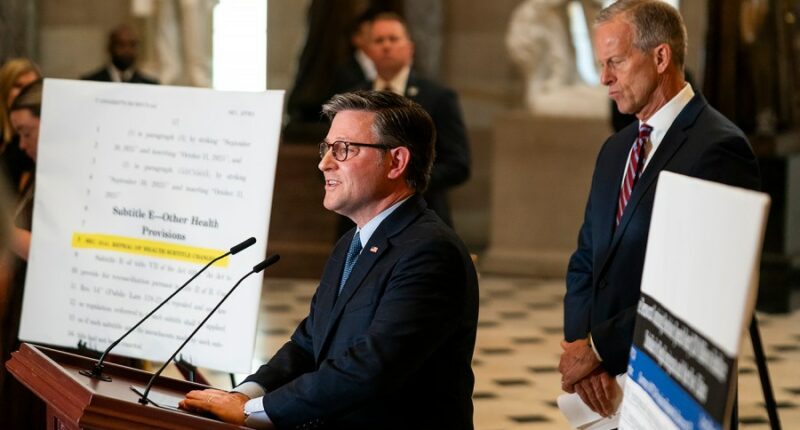Share this @internewscast.com

In the ongoing debate over the federal budget and government shutdown, Republicans in Congress have stood firm against discussing the prolongation of Affordable Care Act (ACA) tax credits. They argue that these talks should be reserved for when the government is operational again, highlighting that there is still ample time to address ObamaCare issues before the year ends.
House Speaker Mike Johnson (R-La.) underscored this point in a briefing on Friday, noting, “That matter is something we’ll tackle toward the year’s end since those provisions expire on Dec. 31. Until then, Congress has the entirety of the next three months to find common ground. Certainly, October can be a month for us to work towards a resolution.”
But if Congress doesn’t act on ObamaCare, many Americans will start feeling the pinch within a few weeks.
Meanwhile, insurance companies are finalizing premium rates now, with the ACA marketplace open enrollment slated to commence on Nov. 1 in most states. Should insurers anticipate that the tax credits will lapse, premiums could potentially skyrocket.
A nonprofit health policy organization, KFF, released data revealing the potential repercussions for Republicans if they fail to effectively communicate their stance.
The KFF analysis reported that a substantial segment of ACA market enrollees—77 percent, or 18.7 million out of 24.3 million participants—reside in states that President Trump carried in the 2024 election. These states benefited significantly from premium tax credits and experienced noteworthy enrollment surges.
A survey by KFF found broad public support for continuing the enhanced tax credits for the ACA marketplace, with 78 percent of adults in favor. This support includes 92 percent of Democrats, 82 percent of independents, and notably, 59 percent of Republicans.
About 4 in 10 adults who support extending the credits said the blame would be on Trump and Republicans in Congress, while only 22 percent said the same about Democrats.
State leaders warn that the repercussions could be immense for some and that the timeline is even shorter than Nov. 1.
“It’s really important to underscore that the first open enrollment period starts October 15 in one of the states [Idaho]. So that’s two weeks from now,” said Devon Trolley, executive director of the Pennsylvania Health Insurance Exchange Authority.
“So, when you’re talking about changing something, this is late. You know, like two weeks is not enough time to really do that without consumer disruption, consumer confusion and, to some extent, consumer degradation. Just from the confusion that it would cause,” Trolley noted.
However, Republican leaders in Congress so far appear unmoved by the threat of escalating health care premiums.
Senate Majority Leader John Thune (R-S.D.) remained adamant Friday that discussions over ACA tax credits cannot happen while the government shutdown continues.
“There are discussions going on with our colleagues on both sides of the aisle, but at some point they have to take yes for an answer,” Thune said in a press conference.
However, the Senate GOP leader said he wasn’t sure his caucus would ultimately have the votes for extending ObamaCare subsidies, initially passed during the COVID-19 pandemic, in a separate bill.
“We can’t make commitments or promises on the COVID subsidies, because that’s not something that we can guarantee that there are the votes there to do,” Thune added.
Even if Congress were to strike a deal after open enrollment starts but before the end of the year, experts are worried the sudden jump in premiums will drive people out of the marketplace.
“I am worried that the sticker shock of sending out a message that says your premium is going to go up 213 percent because that’s one number we’re using in Colorado for one part of our state,” Kevin Patterson, CEO of Connect for Health Colorado, told The Hill.
“We’ll get [consumers] where they won’t come back. Because when you shop for anything else, when you see something, you’re like, ‘Ooh, that’s too much.’ Do you go back? I mean, it’s a really tough point,” he added.
Democrats maintain that blame both the shutdown and the hiked-up premiums that consumers are likely to see next year will be on Republicans.
“Republicans would rather shut down the government than address a health care crisis that is threatening to shut down small businesses across the country. Right now, health care premiums are being locked in for next year,” Sen. Patty Murray (D-Wash.) said in a briefing Friday.
“And because Republicans have refused to save the health care tax credits that millions of people rely on, health care costs are about to more than double for families across the country.”
The Biden administration managed to achieve four consecutive years of record enrollment through the ACA marketplace, with the enhanced tax credits believed to have contributed to the nearly 24 million who enrolled for 2025.
“I don’t think anyone really anticipated how effective these enhancements would be in driving coverage improvement. The fact that there will be 4 million people who lose their health insurance if this policy changes; that’s really what the conversation has to be,” Jessica Altman, executive director of Covered California, told The Hill.
As of Friday evening, Democrats voted down a fourth attempt to end the shutdown, with Thune failing to pick up any additional votes for a clean, seven-week extension.
Nathaniel Weixel contributed reporting.










